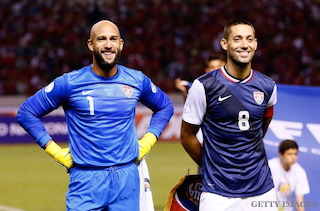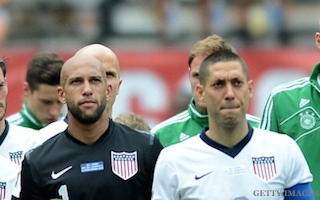The 2014 World Cup will be the eighth held in North or South America. The previous seven all ended with a South American nation raising the championship trophy. That did not faze Alexi Lalas when he told ThePostGame he expects Spain to win the World Cup.
Although a championship for Spain would be historic from a geographical standpoint, Lalas isn't exactly risking his pick on an underdog. Spain won the 2010 World Cup, beating the Netherlands 1-0 in the championship match. But there has not been a repeat World Cup champion since Brazil in 1958 and 1962.
The most recent Las Vegas odds have Spain slotted fourth at 6/1, behind host Brazil at 3/1, Argentina at 4/1 and Germany at 11/2.
Lalas, the former U.S. national team player and current ESPN analyst, said the United States' chances are "grim, but not hopeless," and Vegas has a similar sentiment with odds of 100/1 odds.
U.S. goalkeeper Tim Howard acknowledged the Americans are "dark horses as best" in the eyes of the soccer world, but could win if "we play nearly perfect football.”
For the United States, the 2014 World Cup is a chance for redemption from its past two World Cups. In 2006 the U.S. failed to advance from group play, and in 2010 it suffered a stunning defeat in the first round of the knockout stage. Both times a loss to Ghana was the final match.

The U.S. opens this tournament against Ghana on June 16. So is this one personal after what happened in 2006 and 2010?
"I would say yeah," U.S. captain Clint Dempsey told ThePostGame. "They beat us the last two times in the World Cup and now it's our turn to beat them."
Aside from revenge, the U.S. needs a win against Ghana just as a practical matter of trying to advance from Group G, which also includes Germany and Portugal.
"If they don’t get three points against Ghana, it will be very difficult," Lalas said.
Ghana, led by team captain Asamoah Gyan, has a strong attack that likes to use the entire field when creating an attack. Howard said to stall the Ghanaian attack the United States has to execute two objectives.
"Number one, we have to put pressure on the ball," Howard said. "Putting pressure on the ball will prevent Ghana from executing their offense efficiently, allowing the United States to create turnovers. Number two, is being compact."
That means when the United States is on defense, it cannot allow Ghana to find vulnerable space near the American goal.
The opener against Ghana will be in Natal, located on the eastern coast of Brazil. Its next match on June 22 against Portugal is in Manaus, which requires a flight of nearly four hours. Then on June 24, the U.S. finishes group play against Germany in Recife, which is an even longer flight back to the coast. In total, the team will have to travel almost 3,500 miles in 10 days to play the three games.

The 2014 roster does not include names from 2010 like Eddie Johnson, Brek Shea and Landon Donavan. But Howard likes the youth and balance.
"We've got guys that can play multiple positions which I think helps any team because your roster is so limited with 23 players," Howard said. "You need guys who can not only play in the middle but can play in the left. There are injuries -- knock on wood -- and suspensions to the yellow cards and fatigue so you need guys who can contribute so I think that balance and particularly the fact that we are young helps us."





